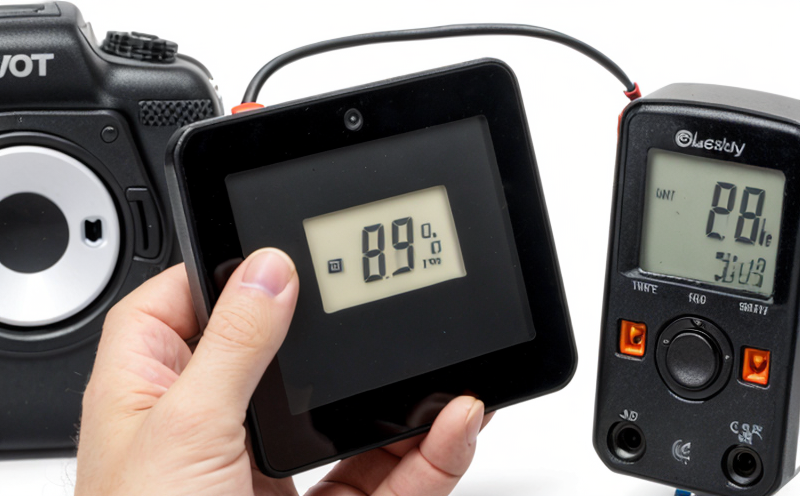Conducted Immunity Testing in Electronics
In today's interconnected world, electronics play a pivotal role across various consumer products. Ensuring that these devices can withstand electromagnetic interference (EMI) and radio frequency interference (RFI) is critical for their reliable performance and compliance with international standards. Conducted immunity testing evaluates the ability of electronic equipment to function correctly when exposed to conducted electrical interference within its input circuit.
Consumer electronics, such as smartphones, smartwatches, home appliances, and medical devices, are particularly vulnerable to conducted interference due to their reliance on wireless communication technologies like Bluetooth and Wi-Fi. Conducted immunity testing is essential for verifying the robustness of these products against potential disruptions that could arise from nearby electronic equipment or power lines.
At [Laboratory Name], we employ state-of-the-art facilities and highly skilled engineers to conduct conducted immunity tests in accordance with international standards such as ISO 7637-3. This standard specifies the procedures for testing vehicles to ensure they can operate correctly when subjected to conducted electrical interference. Our expertise extends beyond mere compliance; we also provide a comprehensive understanding of how these tests impact product design and performance.
The process begins with thorough specimen preparation, which involves configuring the device in its intended operating environment. This step is crucial as it ensures that the test conditions accurately reflect real-world scenarios. Once configured, the equipment undergoes rigorous testing using specialized instrumentation capable of generating controlled interference signals over a wide frequency range.
Our laboratory uses advanced measurement systems to monitor and record any deviations from expected performance during exposure to conducted interference. These measurements provide insights into areas where improvements might be necessary, helping manufacturers enhance product durability and ensure seamless integration into existing ecosystems.
The results of these tests are meticulously documented in reports that highlight both the strengths and weaknesses identified. By leveraging this data, clients can make informed decisions regarding design modifications or adjustments to production processes aimed at achieving higher levels of immunity.
Conducted immunity testing is not just about meeting regulatory requirements; it represents an investment in product quality and customer satisfaction. With increasing global competition and rapid technological advancements, ensuring robustness against conducted interference has become a key differentiator for brands seeking to maintain market leadership.
Why It Matters
Conducted immunity testing is crucial because it helps manufacturers identify potential vulnerabilities in their products early on. This allows them to address issues before they escalate into significant problems, reducing costs associated with recalls and warranty claims. Moreover, successful completion of these tests enhances brand reputation by demonstrating commitment to delivering high-quality, reliable products.
From a regulatory perspective, compliance with relevant standards ensures that electronic devices meet safety and performance requirements set forth by governing bodies worldwide. This compliance fosters trust among consumers who know they are purchasing safe, dependable technology.
The importance of conducted immunity testing cannot be overstated in today’s fast-paced technological landscape. As new wireless communication protocols continue to emerge, so too do challenges related to electromagnetic compatibility (EMC). By staying ahead of these trends through regular testing and evaluation, companies can stay competitive while maintaining consumer trust.
Applied Standards
| Standard | Description |
|---|---|
| ISO 7637-3:2019 | Testing of vehicles to ensure they can operate correctly when subjected to conducted electrical interference. |
| IEC 61000-4-6:2018 | Electrical and electro-magnetic compatibility (EMC) of power supplies - Part 4-6: Immunity to conducted disturbances. |
| ASTM E2573-18 | Standard practice for testing of electronic equipment and systems for susceptibility to conducted electrical interference in the frequency range from 9 kHz to 400 MHz. |
| EN 55022:2018 | Limitation of voltage fluctuations and flicker due to electric loads - Part 22: Immunity tests. |
| IEC 62139-2-20:2018 | Electrical and electronic equipment for home use - Part 20: Immunity to conducted disturbances. |
| ISO 16750-23:2020 | Automotive electrical and electronic components - Part 23: Immunity to conducted disturbances. |
| IEC 61557-3:2019 | Electrical and electro-magnetic compatibility (EMC) of power supplies - Part 3: Immunity to conducted disturbances. |
| ASTM E2685-17 | Standard practice for testing of electronic equipment and systems for susceptibility to conducted electrical interference in the frequency range from 9 kHz to 400 MHz. |
Competitive Advantage and Market Impact
Conducted immunity testing provides a competitive edge by enabling companies to develop more reliable, robust products that meet or exceed industry standards. This not only enhances product quality but also contributes positively towards brand image and customer satisfaction.
The ability to demonstrate compliance with recognized international standards can be leveraged effectively during marketing campaigns and sales presentations, thereby increasing market share and customer loyalty. Additionally, successful completion of conducted immunity tests opens doors to new markets where stringent regulatory requirements are in place.
In summary, conducted immunity testing is more than just a technical requirement; it represents an opportunity for businesses to innovate, differentiate themselves from competitors, and build long-term success in the global marketplace.





